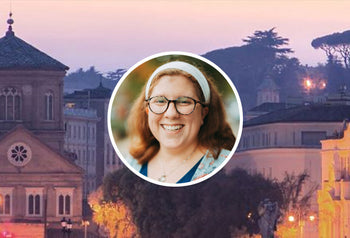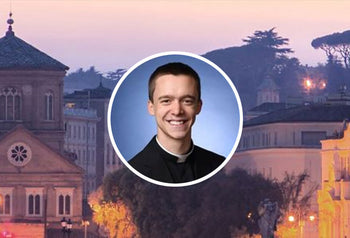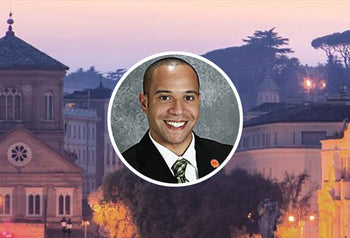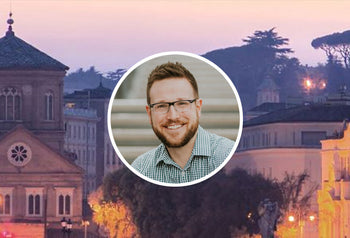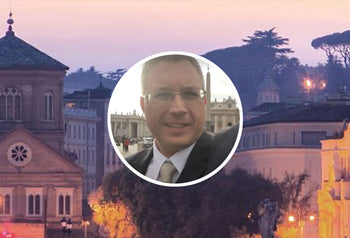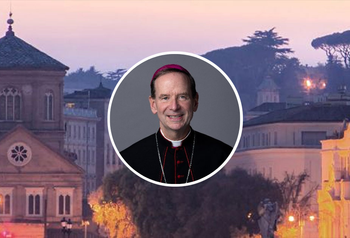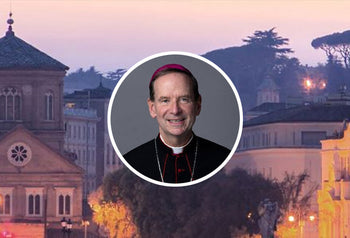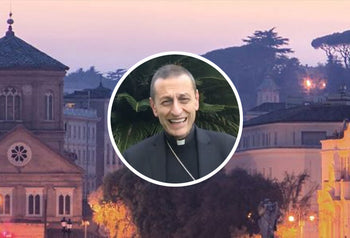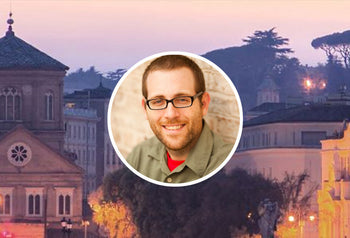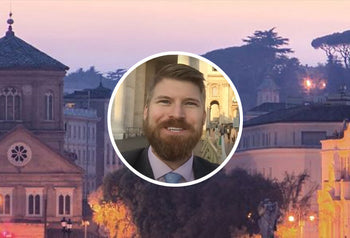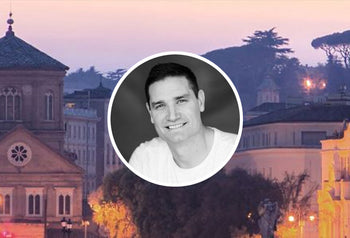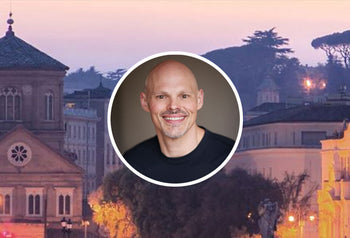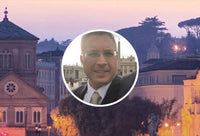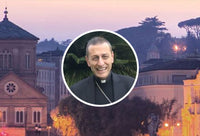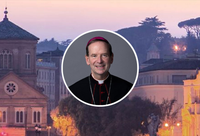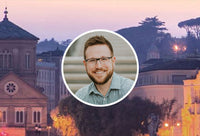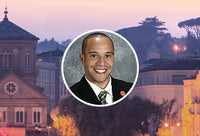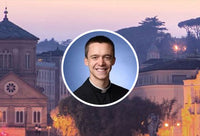In the fall of 2018, Ave Maria Press began a new initiative called Ave Explores, which takes an in-depth look at issues facing the Catholic Church. The first topic in the series was the Synod on Young People, the Faith, and Vocational Discernment, which was held in Rome from Oct. 3–28.
Explore Series
Explore by Week
Introduction to the Synod
Katie Prejean McGrady discusses what to expect from the Synod on Young People, the Faith, and Vocational Discernment.
Articles
Key Takeaways from Week 1 of the Synod
Katie Prejean McGrady discusses the key takeaways from the Synod on Young People, the Faith, and Vocational Discernment.
The Ins and Outs of the Synod Process
Paul Jarzembowski, Assistant Director of Youth and Young Adult Ministry at the USCCB, explains the ins and outs of the Synod, defining what it is and how the process unfolds week to week. Learning how the Synod works, and understanding the terminology of the Synod, the structure of the Instrumentum Laboris, and the way discussions happen in the Synod hall and small groups, helps us grasp the significance and importance of this necessary work happening in Rome and why it ultimately matters for us both right now and in the future.
Key Takeaways from Week 2 of the Synod
Jonathan Lewis provides insight about the synod's small group conversations regarding the preparatory document, Instrumentum Laboris.
Articles
The Healing Power of Listening: Part 1
Listening changes young people. Good listening changes their mood, their brains, and even their souls. I couldn’t be happier that our Holy Father and his brother bishops are meeting at this important time to talk about how to effectively share the Good News with young people. I’m ecstatic that they’re exploring how listening—something we can all do—helps and heals our young people. The latest neuroscience research indicates when someone feels heard, certain reward centers in the brain light up and produce feelings of relief and pleasure. We’ve learned that active, empathic listening has the power to heal the damage done to the young brain caused by trauma. As a counselor of adolescents, each day I sit as an empathic observer to the struggles, pains, and even joys of young people. I watch as listening heals wounds in their brains, hearts, and souls. I see first-hand how the experience of being heard frees them from negative, anxious, and depressive thought patterns and the bondage of triggers. I regularly observe my simple listening melting angry hearts and creating bridges between God and young people who’ve sworn him off. The experience of being listened to and heard reduces, and can even eradicate, symptoms of post-traumatic stress disorder (PTSD). All of this because a young person felt heard. Jesus was the master listener. He listened by: observing people being present to them being open to what they had to say being vulnerable and allowing himself to be affected by what they said asking evocative questions and giving them a sense that he was genuinely interested in them and wanted to understand what they were experiencing. These encounters often resulted in miracles manifested in the mind, body, heart, and soul. You may well be thinking, “Wait a minute Roy, I’m not Jesus. I’m just a parent, a youth minister, a catechist, or a priest, grandparent, educator, or some other caring adult. I can’t work miracles and I’m certainly no therapist.” Correct; you are not Jesus. If you thought you were, you’d need my services, so there’s some good news! But you are not “just” anyone. You are a child of God and by virtue of your Baptism have real power to work miracles in the name of Jesus Christ. So, maybe you’re not a counselor, but the gift of counsel is not reserved for licensed psychotherapists. It is a gift of the Holy Spirit. You don’t need a license to listen well and allow your ears, eyes, and heart to be a conduit of God’s healing grace. You care and that is a real grace. Do you know how many people really don’t care about what happens to young people? Whose hearts don’t break when they hear the stories of loss, trauma, drama, and tragedy? Who has little-to-no empathy for the struggles that adolescents face in today’s world? The fact that you care and want to help is a real grace. Take a moment to thank God for that grace. During the next few weeks, I’ll be breaking open the process of listening and the skills needed to listen well to young people. As St. Thomas Aquinas tells us, “Grace builds upon nature.” You’ve been given the grace, but learning, developing, and improving our skills allow that grace to flow through you more freely and to greater effect. I will give you tips, tools, specific language, and even questions that will give you more confidence in your ministry. Here’s a snapshot of the weeks ahead: What Listening Is and What It’s Not Why Good Questions Must Come Before Good Advice How to Let Young People Know What You’re Hearing Them Say and Why It Matters What Is Our Role after Listening? If you have any specific questions about listening feel free to email me at roy@todaysteenager.com so I can be sure to answer them in the weekly articles. Thanks for what you do for young people and our Church!
Articles
Advice for Young People from Bishop Caggiano
Bishop Caggiano reflects on the one piece of advice he gives to young people today. This advice can be summed up in one word that his Italian father said to him often “Coraggio! Courage!” Throughout our lives we may be tempted to blend in with the crowd, to go along with what everyone is doing. Courage is the gift that helps us to resist that temptation and stand up for what is true and right. The Church needs young people to stand up for what they believe and is dedicated to stand with them.
Videos
Key Takeaways from Week 3 of the Synod
The third week of the synod proved just as exciting and insightful as the first two. More bishops and auditors gave interventions, including Archbishop José Gómez, who discussed the importance of challenging young people to strive for and desire sanctity. His comments come on the heels of the canonization of seven new saints. The timing of the canonization of these holy men and women is an indication to all of us, but especially the young people, that this synod is about the need to strive for and desire holiness. We can strive for sanctity and encourage youth and young adults to yearn for heaven when we listen well to them. Listening is not a passive activity or merely a political ploy. Engaging with a young person on their own level to hear their thoughts and help them in the process of discernment and growing in faith is one of the most important things we can do. The small groups continued meeting this week, discussing part two of the Instrumentum Laboris and offering insights into what they would like to see included in the final document.
The Family at the Synod
Jonathan Lewis, an auditor at Synod 2018, reflects on how the Synod on Young People is addressing young couples, married life, and the family, and how it’s important for the Church to see itself as a family, how supporting young people requires first supporting families, and how to walk with young people as they discern marriage and family life as their vocation.
The Art of Authentic Friendship
We are all created for relationships. We thrive when we live in community with God and with others. Why? First, the nature of God is community. God is a living community in union with the Son and the Holy Spirit. You could say God is a family within himself—an active community loving each other. God’s very nature is a community of persons, never isolated, never alone, and always loving. Second, God created us out of his trinitarian nature; out of community. At the beginning of the creation story in Genesis, we see the Trinity creating. It states in Genesis, “Let us make…” The “us” here is the Father, Son, and Holy Spirit uniquely one and uniquely individual, actively and lovingly creating us. Third, if God is community and God created us out of community, then he created us for community. God said, “It is not good for man to be alone.” Thus God never intended, never wanted, and never created us to be alone. We are created to be in relationship with God, to actively participate in a friendship with Jesus and to be intimately guided by the Holy Spirit. God also created us to be in relationship with each other. He created us out of love and for love, to live in friendship and community. For married people, community is first their family with God at the center. They are called to model the Trinity in their commitment to God, each other, and with their children. Yet they also are called to extend their community to others. Marriage isn’t just an inward love and focus on the family, but is also an outward extension of God’s love to others. Those who aren’t married also are called to model their friendships, relationships, and community life with God at the center. It is true that authentic friendship and community can only be fully understood and experienced with God as the head, Jesus as the model of friendship, and the Holy Spirit as the guide to holiness. Authentic friendship is God-centered, loving each other as God loves, and desiring the good for the other. What can we do to help young adults foster authentic friendships? The Church must invite young adults into the life of the community where they can experience authentic friendship. God’s people help provide healthy opportunities for young adults to experience God-centered friendship. The Church should reach out to young people. Many young adults are not going to church. They feel disconnected, unheard, and lost in the flock. The Church exists to help them find God, encounter Jesus, and walk with the power of the Spirit. Young adults can find God’s active presence in the world and in their lives in the sacramental life of the Church. Married couples should invite young adults into friendship with their family. Healthy, authentic families are safe places for young people to learn what it means to live, love, and serve. What can young adults do to find and build authentic friendships? Embrace each unique season of life. The temptation for many of us is to look beyond instead of living fully in the season God has us. Be in an active relationship with God. Make Jesus a priority in your life. Too often we put off faith for tomorrow. We blame the Church or our families for what they didn’t or don’t do for us, but these excuses only keep us from the abundant life Jesus call us to when he says, “Follow me.” Be an active member of a parish. The Church needs you. Invest in your parish by offering your time, talent, and treasure. Build friendships with God as the center. We need others to help us become the person we are called to be. It’s important that we begin to build intentional friendship with faith as the foundation. Embrace a missionary mindset. Jesus tells us to love God and love our neighbor. These two commandments are the guardrails that keep us focused on the life God wants for us. The word mission means to “be sent.” We are sent by God to love those around us. Community thrives when its goal is to strengthen each other to live for Christ boldly and lovingly in the world.
Articles
The Energy of Young People at the Synod
Bishop Frank Caggiano shares how hopeful he is to be interacting with so many young adults in Rome at the Synod. One young man shared in his intervention his experience of persecution in Iraq. Even after many of his friends have been killed, he still believes and is willing to stand up for his faith. Caggiano is inspired by this faith and resilience and knows other people are too. One participant used the image of oaring a boat. The oars guide the boat in the desired direction, just as young people desire direction from the Church. From all of these interventions by young people, Caggiano is feeling hopeful for the future of the Church.
Key Takeaways from Week 4 of the Synod
The final week of the synod was filled with equal parts excitement and downtime. The synod fathers and auditors wrapped up their general sessions and small group meetings while the writing committee completed the final document, which was presented to the synod assembly on Tuesday and Wednesday. The final document will be released publicly on Sunday. Once we get this final document, which is the summary of the discussions and a snapshot of initiatives to be implemented, then the real work of the synod can begin. In the video below, Katie Prejean McGrady discusses how the next steps—work in parishes, dioceses, schools, and homes—is critically important to the success of this Synod on Young People.
Articles
Universal Call to Holiness
Paul Jarzembowski reflects on the seven saints canonized by Pope Francis on the second weekend of the Synod, sharing how profound it was to see five lesser-known men and women canonized alongside two famous men, Paul VI, and Oscar Romero, and how we are all called to holiness and are challenged to become saints ourselves. The Synod on Young People is greatly considering this universal call to holiness, and how we are all invited to live within our particular circumstances and use our unique giftedness for the glory of God and to become saints.
Videos
How to Earn the Ear of the Next Generation
As we ate, I could tell that these college students were digesting more than their chicken sandwiches. After all, Chick-Fil-A usually brings smiles, but these people had pensive looks on their faces. So I asked, “What’s on your mind?” It was the homily from the past Sunday. The priest had addressed a sensitive subject for most of them. They weren’t sure what to make of it because it didn’t quite match their reality. So they asked me for my thoughts. I was tempted to recite Scripture or what the Church teaches on the subject, but I could also see that they wanted to know how it was impacting my life. Whenever a young person asks what you think it can be intimidating. There is the pressure to give them the perfect answer, but if there is one thing the synod is teaching us it’s that young people want authenticity. I told them, “Like you, I’m still processing it, but this is what I do know…” I went on to share with them what I believed, what I knew, and what I didn’t know. I knew my role at that moment wasn’t to give them an answer but show them how to process the deep and enriching truths of our faith. That’s where we mess up as a Church when it comes to the questions of young people in our parish. We give them answers, but we don’t show them the work, struggle, and journey that get us there. That’s because it means being authentic and vulnerable. It means admitting to mistakes and saying, “I don’t know.” And, that’s okay. In fact, we need to promote more authenticity and we can do that in several ways: Viewing ministry and outreach as an apprenticeship opportunity: Inviting young people to serve is more than just getting them active. It’s inviting them into another way of learning about the God who loves them. The best way to do this is to partner them with men and women who are passionate about their involvement in the Church. Encourage them to engage in one-on-one conversations that go beyond the service opportunity. Have your active volunteers and leaders look at the young people who surround them as an investment in growing leaders. Young people crave the attention, wisdom, and passion, which will give them an authentic look at parish life. Training catechists to act like mentors: If you want young people to engage with the older congregation then it starts when they are small children. Have your catechists close the books so that they can invite children and teens into conversation. Use your faith formation as a guide where young people learn how to interact with adults. This means training your catechists to ask questions that lead to conversations where information is acquired. It’s about instilling trust and showing young people that your value doesn’t come from what you know, it’s based on the fact that you are a child of God. Asking leaders to be authentic from their platforms: Young people care about the teaching of the Church and they want to know the truth of the Gospels, but they also want to know how it’s impacting your life. That’s a responsibility the entire Church owns, but it starts with those in leadership. Pastors need to share what’s happening in their lives from the pulpit. Lay staff and volunteer leaders need to get out from behind their desks and meet with people for one-on-one conversations. The more vulnerable we can be and share what Christ is doing in our lives the more we can show young people the real God. We’ll break down the lie that you need to be perfect to connect with him and that he loves you regardless of where you are in life. Whether you are employed or just someone who shows up on Sunday, reach out to someone young and get to know them. Invite them into your journey with God and offer to walk with them as well. Be the true Church by remembering that even though we have a lot to figure out, we’re still loved by him.
Articles
The Great Diversity of the Church at Synod 2018
Bishop Caggiano shares his impressions of the gathering in Rome, reflecting on how incredible it is to see the universality of the Church, and the remarkable differences of this universal Church. His hope for the Synod is to create a basic methodology of youth ministry. Asking fundamental questions like: what is it that every young person is looking for regardless of their diverse lives? What is it that every youth minister needs to support the young in their journey of faith and struggles of life? He is confident that the Synod can address this basic methodology to give those working in youth ministry guidance and a common foundation.
Key Takeaways from Week 5 of the Synod
The Synod on Young People ended Sunday with a homily from Pope Francis that encouraged young people to go forth and welcome others into the Church, to listen, to accompany, and most notably, to be unafraid to “journey together” with those they meet. The synod fathers reiterated this in a short letter written to the young people of the world, encouraging them to go “be a brighter future” with their enthusiasm, new ideas, and passion for the faith. This was reminiscent of something Pope Francis said in March at the pre-synod gathering in Rome, “If you are not present, then a part of the access to God is missing.”
Hopes for After the Synod
Bishop Caggiano shares his hopes for what happens “after the synod.” He discusses a plan for his local diocese of Bridgeport that would energize and mobilize the young people of Bridgeport. His desire is to invite youth, young adults, and their mentors to participate in a local synod. Those gathered would listen, talk, and learn together, like those who gathered in Rome. The goal is to implement the insights and recommendations from Pope Francis and the Synod 2018 in their local Church and diocese. All of this is intended to get young people fully involved in the life of the Church.
Virginia Diocese Offers Teens a Chance to Interact with Their Bishop
Ave Explores: Tell us about RALLY. What is this event? What’s its purpose every year? Why does Arlington invest in doing a diocesan-wide event for high schoolers? Burbidge: “RALLY is my annual opportunity to gather with nearly 800 high school-aged students of my diocese. I invite them to join me in this celebration of our Catholic faith. The event hosts opportunities to learn about the faith through keynote speakers and breakout sessions, but it also gives them a lot of time for fun and festivities with their peers and adult leaders. The Mass that I celebrate with them is one of the most energetic youth Masses of the year. The event ends with a beautiful Eucharistic procession where I encourage the young people to listen to how the Lord might be calling them. “Large diocesan events can be very transformative in the life of a young person. When a young person is surrounded by many hundreds of other young Catholics, they discover a strength and energy in those numbers. Suddenly things they have learned from their parents become affirmed when hundreds of other young people are following that same belief.” Ave: What else does Arlington do in its youth office/outreach? What would you say characterizes the youth and young adult ministry in Arlington? Burbidge: “We provide several large diocesan-wide events for young people each year. My favorite one is our Diocesan WorkCamp where 800 teens and 400 adult leaders spend a week repairing homes in our diocese. I have seen such beautiful transformation in the lives of the young people, the adults, and the residents that we serve. “While large events serve a wonderful purpose, the most important youth ministry that happens in our diocese is within each family. There our parish youth ministries are able to build and help form the consciences and faith lives of these young people. The Office of Youth Ministry works with parishes to hire directors of youth ministry and then supports them to be a well-trained, prayerful, vibrant community of youth workers. Part of that training is to be sure that they are thinking beyond the ‘youth group’ model. Helping parishes to find new and creative ways to get parents and young people growing in their faith together through a variety of parish ministries. For example, we promote and support large sports and scouting programs and provide resources for these ministries to better form parents and adult leaders to accompany young people on the journey of faith.” Ave: What was the impetus for this? Where’d the idea come from, and why did you and the Diocese want to host the listening session at the annual RALLY? Burbidge: “In the past, I have had an opportunity at RALLY for a Q&A with the youth. We spend about an hour for them to ask me questions about the Church and what it means to be their bishop. This year, in light of the Synod on Young People, the Faith, and Vocational Discernment, I thought it would be good to flip that conversation and ask the young people my questions.” Ave: What preparations did you and the team make for the listening session? Were participants told ahead of time? Were they able to submit questions early? Burbidge: “I worked with my staff to come up with a list of about eight questions to ask the young people. I asked them about their joys in life and in their faith. Then I asked them about the things that bring them struggles. I asked what they felt my generation did not fully understand about them and what they most wanted me to know about them. The questions were sent out through the parish youth ministries in advance to give the young people some time to reflect upon them.” Ave: How was the listening session received? Did teens engage with you and participate fully? Burbidge: “The listening session was very powerful, and, for me, it was particularly informative! There was a lot of laughter, applauses, and cheers. There were some very genuine and heart-felt responses. They were all eager to share their perspective and their story. I felt bad that sometimes I would have to move on to the next question despite there being fifty more young people waiting to respond! At the end, we encouraged the young people who felt they did not get the chance to share to send in their responses via email and they would be passed directly to me.” Ave: What were some of the best questions asked and best answers received? Burbidge: “The answers from the young people seemed to fall into a few specific categories. There was a genuine desire for the truth. They know that the Church is going through a rough time right now, but they want to know the truth of those situations. They do not want a sugar-coated version of the truth; and they want to be a part of the solution. “They expressed a desire for better teaching so that they can respond to their friends who challenge them in their faith lives. “There were several responses about Church teaching on sexuality and a desire to better understand why the Church has these teachings. Some expressed a concern that the Church could have a ‘friendlier face’ if we want a chance to bring more of their friends into the Catholic faith. “Several young people shared that their faith lives are most influenced by their parents, their grandparents, and the adult leaders in their lives, as well as by Eucharistic Adoration and through learning about the lives of the saints.” Ave: What did you learn from this? How did it help you as the shepherd of Arlington? Burbidge: “One of the surprising pieces to me was how many of the teens from public schools expressed how difficult it is to be Catholic at their schools. Several commented that they have tried to create Catholic groups but found it to be not supported by their administrators. My staff would like to support the parish directors of youth ministry in finding ways to create opportunities for students to live out their faith within their schools.” Ave: Why do you think it’s important for this listening session to happen, both at a parish and diocesan level? How can other parishes and dioceses do this, too? Burbidge: “I strive to be a bishop that is out with the people of God. It is my favorite part of being a bishop and it brings me great joy and energy! I welcome the opportunity for the teens of the diocese to share with me their thoughts, joys, and struggles. I want to know what it will take for them to feel most at home in their Church and I want to work with my staff to see how the Church can best support them. I look forward to having this dialog on a regular basis in an informal way at their parishes and in a more formal way each year at RALLY! “I have wonderful priests in my diocese who I know to also be very supportive of the young people in their parishes. I encourage them to set up similar opportunities to meet with their teens and discuss how their parishes can better serve their needs. It is my prayer that, now that this synod has ended, all of us in the diocese can begin to unpack what is learned through the final document. “We are always looking to learn what other dioceses are doing well and we welcome the opportunity to share our successes also. “One thing for sure is that it is going to take all of us working together to transform our Church into the strong source of holiness that our culture needs today!” Ave: Any last thoughts or words of encouragement? Burbidge: “During our listening session, the young people were being very kind and humble. They were not making mandates or ultimatums. They may not agree with everything that the Church teaches, but I found an openness to the fact that perhaps they don’t know everything and that the Church possesses a wisdom beyond their own. “I think we are sometimes afraid to ask young people what it is they want from the Church for fear that they want us to change Church teaching. The good news is that few are asking us to change what we believe. The hard part is that all of us as adults need to invest more time walking alongside young people in their faith lives. This is not easy in our extremely busy lives…but it is worth every minute.” Special thanks to Kevin Bohli, director of the Office of Youth and Young Adult Ministry for the Diocese of Arlington, for helping set up this chat with Bishop Burbidge and to Joe Cashwell for the photos of the event.
Wise Words from St. Paul VI
Pope Paul VI, most known for taking the reins of Vatican II after the death of St. John XXIII and writing Humanae Vitae, was canonized on October 14, 2018, by Pope Francis. It’s significant that his canonization occurred in the midst of the Synod on Young People, the Faith, and Vocational Discernment—not because he was known for his work with youth and young adults, but simply because the synod process exists because of his leadership. Before the Second Vatican Council, it was common for cardinals and bishops to gather in ecumenical councils to discuss important and relevant issues to the life of the Church. After Vatican II, Pope Paul VI established the “Synod of Bishops”—a gathering of bishops from around the world to discuss pertinent issues, craft documents to advise and lead the faithful, and guide the Church in her evangelistic mission. From 1963 to 1975, Pope Paul VI presided over three synods covering the preservation and strengthening of the Catholic faith, the ministerial priesthood, and evangelization in the modern world. The Synod on Evangelization in the Modern World resulted in an Apostolic Exhortation entitled Evangelii Nuntiandi, which is just as relevant today as it was in 1975. Paul VI implored the faithful not to hide Jesus, but to bring him boldly to the world, announcing the Gospel with our lives and challenging us to recognize the evangelical mission that is the very nature and character of the Church. If we thought the concept of “new evangelization” was just making better graphics for the parish bulletin or updating a diocesan website, by the time you’ve finished reading Evangelii Nuntiandi, you’ll realize it’s so much more. In honor of Pope Paul VI’s canonization and because Evangelii Nuntiandi should be in the hands of every person who finds themselves in a position to evangelize (every Baptized person), here are a few key quotes to inspire you in your work of sharing the Gospel and living the faith: The necessity of evangelization “For the presentation of the Gospel message is not an optional contribution for the Church. It is a duty incumbent on her by the command of the Lord Jesus, so that people can believe and be saved. This message is indeed necessary. It is unique. It cannot be replaced.” (5) Evangelization is the very work of the Church “Evangelizing is in fact the grace and vocation proper to the Church, her deepest identity. She exists in order to evangelize, that is to say, in order to preach and teach, to be the channel of the gift of grace, to reconcile sinners with God, and to perpetuate Christ's sacrifice in the Mass, which is the memorial of his death and glorious resurrection.” (14) The evangelizing community “For the Christian community is never closed in upon itself. The intimate life of this community—the life of listening to the Word and the apostles’ teaching, charity lived in a fraternal way, the sharing of bread his intimate life only acquires its full meaning when it becomes a witness, when it evokes admiration and conversion, and when it becomes the preaching and proclamation of the Good News. Thus it is the whole Church that receives the mission to evangelize, and the work of each individual member is important for the whole.” (15) The need for witnesses “Modern man listens more willingly to witnesses than to teachers, and if he does listen to teachers, it is because they are witnesses.” (41) The use of media “Our century is characterized by the mass media or means of social communication, and the first proclamation, catechesis or the further deepening of faith cannot do without these means, as we have already emphasized. When they are put at the service of the Gospel, they are capable of increasing almost indefinitely the area in which the Word of God is heard; they enable the Good News to reach millions of people.” (45) Unity among believers “The Lord's spiritual testament tells us that unity among his followers is not only the proof that we are his but also the proof that he is sent by the Father. It is the test of the credibility of Christians and of Christ himself. As evangelizers, we must offer Christ's faithful not the image of people divided and separated by unedifying quarrels, but the image of people who are mature in faith and capable of finding a meeting-point beyond the real tensions, thanks to a shared, sincere and disinterested search for truth.” (77)
Articles
Key Takeaways from Week 6 of the Synod
When the Synod on Young People began, much of the Catholic world had one big question: Why does this matter? Why is it necessary and good that we talk about young people, especially in the midst of turmoil, confusion, and scandal? Ave Explores explained why the synod mattered—because young people matter. Now that the synod is finished, the final document is being translated, and Pope Francis is writing his Apostolic Exhortation, we have to ask ourselves another big question. What’s next?
Articles
A Final Look at the Synod on Young People
The Synod on Young People, the Faith, and Vocational Discernment ended in October with a final document that focused on a variety of key themes, ultimately encouraging the intentional commitment to accompanying young people as they grow in faith and encounter Jesus. In January, the document was translated into English, giving us access to an even deeper understanding of the goal and vision of the synod, the mind of Pope Francis, and the mission for ministry to youth and young adults going forward. Over the next few days, Ave Explores contributors will examine quotes from the synod’s final document, highlighting significant themes and explaining the ministerial focus to which this document calls us. You can read the full document here.
What the Final Document Looks Like
The Synod on Young People, the Faith, and Vocational Discernment was complicated (from the outside looking in) and at first glance, the document could seem that way as well. It’s long—clocking in at 167 paragraphs—and rich, covering a variety of themes and exploring different ministerial approaches. However, if we approach the document with a spirit of humility and open-mindedness we can tackle it. We can approach the young people we work with in that same spirit: with an openness, a willingness to listen, and a desire to truly learn from what they have to share. We’ll look at both what the final document looks like and how to approach young people with a humble spirit and heart as we listen to and dialogue with them.
Articles
Important Movements Highlighted in the Final Document
The final document from The Synod on Young People, the Faith, and Vocational Discernment isn’t short. However, four themes are repeated throughout: listening the necessity to encourage conversation and dialogue the duty placed upon us to both teach the truth and live the truth the role of the mentor and accompanier who walk with young people on their journey of faith, and parents as living witnesses to the faith to help model and teach young people about the Church The family is the first community of faith and parents are the first teachers of the faith. Within the family, a young person can first truly taste the love of God, see the practice of God’s presence, and witness others striving for holiness. We explore the key theme of the importance of the family’s role in the formation of faith.
Encouragement & Inspiration from the Final Document
It’s remarkable that The Synod on Young People, the Faith, and Vocational Discernment occurred during this particular time in human history—a time marked by technological advances and changes nearly every day, where more information is shared quicker than ever before, and with access to nearly everything available at any moment, in almost any place. This synod even played out in an entirely new way because of technology, with videos and streaming from inside the synod hall, nearly 24-hour news coverage of the events, hashtags, online surveys to gather information and give feedback, and of course, the use of the internet to disseminate the findings and writings of the synod before, during, and after. This is a digital age and youth and young adults are deeply influenced by the digital landscape. Whether it’s social media, constant news, the endless cycle of stream-ready content, and the temptation to always be surrounded by the visual and audible noise of the day, the synod addressed the pros and cons of the age of the Internet. We examine digital reality in light of the final document.
Young People Desire Holiness
It’s very easy to assume that once a synod is finished, it’s over. But it’s really just the beginning of the work we’re charged with doing. The Synod on Young People, the Faith, and Vocational Discernment is trying to set the whole Church—not just those paid to do so—on a course to focus attention on the youth and young adults. Now that the synod is over and the final document released, the real work begins in putting these ideas and plans into action as we await an Apostolic Exhortation from Pope Francis. The final document does not conclude with a program or an action plan to implement. Instead, it encourages mentors, accompaniers, parents, priests, religious, consecrated, married couples, and single people to live lives of beautiful, rich, joyful holiness.


